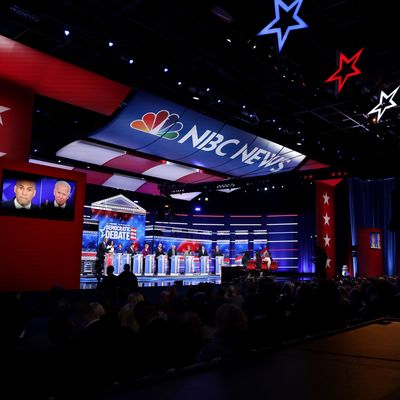
The next Democratic primary debate will take place as scheduled on Thursday after the Democratic National Committee helped bring a labor dispute to an end. Members of Unite Here Local 11 union had been engaged in a fractious labor dispute with Sodexo, a massive private contractor that provides catering services to Loyola Marymount University. As the New York Times reported on Friday, all seven candidates scheduled to appear this Thursday announced that they won’t cross a planned picket line.
That left the DNC in a bit of a pickle, since it can’t host a debate without any candidates. DNC spokeswoman Xochitl Hinojosa told the Times that the committee was exploring its options, and that chairman Tom Perez, once the secretary of Labor under Barack Obama, “would absolutely not cross a picket line and would never expect our candidates to either.”
The DNC reiterated that commitment to New York Magazine on Monday. “Tom Perez spent the entire weekend on the phone with various stakeholders, including Sodexo, LMU, and Unite Here,” Hinojosa said. “As a former Labor secretary who handled several labor disputes, he understands the importance of getting the parties back to the table, and expects that to happen promptly.” Unite Here Local 11 did not return a request for comment by press time. But in a press release issued on Friday afternoon, it said that “a community delegation” comprised of union members and community activists “is going to the LMU president’s office to express their support for the workers and end the stalemate.” It criticized Sodexo for canceling scheduled contract negotiations last week.
Ada Briceño, a Local 11 co-president, previously told NPR that the union “felt that it would be imperative to let the candidates know that we would be holding a picket line on Thursday.”
“I think it’s imperative for wages and health care to be taken care of and our contract to be settled,” she added. “It has become clear to us that the company Sodexo is not taking the workers seriously.”
On Tuesday morning, Unite Here Local 11 announced in a press release that it has reached a tentative contract agreement with Sodexo. The agreement, which will last for three years, “includes a 25% increase in compensation, a 50% drop in health care costs, and increases workers’ job security.” Thursday’s debate will go on as scheduled, the DNC confirmed in a separate statement. “Every worker deserves fair wages and benefits. That’s why I was proud to help bring all stakeholders to the table, including UNITE HERE Local 11, Sodexo, and Loyola Marymount University, to reach a deal that meets their needs and supports workers,” Perez said. “I commend Sodexo and UNITE HERE for coming together in good faith to forge an agreement that is a win-win for everyone, and I appreciate the constructive engagement of LMU leadership which was indispensable to the resolution of this negotiation.”
In its press release, the union thanks the DNC for helping broker the agreement with Sodexo. And as a former labor secretary, Perez certainly has a useful set of relevant skills. But the situation was also something of a near miss. The window for helping both parties reach a resolution was never that wide in the first place. Sodexo isn’t known for its amicable approach to contract negotiations. The French multinational conglomerate does, however, have an international reputation for pushing workers repeatedly to the brink of striking. Sodexo workers in the U.S. and the U.K. have complained that their workplaces are understaffed, that their workloads are unmanageably high, and that they’re so underpaid they qualify for welfare.
One obvious solution would have been for the DNC to relocate Thursday’s debate — for a second time. The University of California, Los Angeles was previously scheduled to host, but the DNC deprived the school of hosting privileges over a different labor dispute. The American Federation of State, County and Municipal Employees Local 3299, which represents thousands of employees within the University of California system, filed three unfair labor practices charges this year over plans to outsource unionized jobs to private contractors. Over 25,000 unionized UC workers held a one-day strike in November.
While it may seem like simple bad luck for the DNC to encounter two separate labor disputes in the process of planning one debate, there’s a broader and more complicated trend at work. Though Unite Here’s planned picket line isn’t a strike, it doubles as a reminder that strike activity in both the private and public sectors is higher than it has been in years. December’s back-to-back picket lines might be somewhat unusual, but this probably won’t be the last time a labor dispute forces the committee to change its primary-season plans.
A strike wave creates obvious logistical challenges for the candidates and for the DNC. But picket lines are also opportunities. Wage growth has been so slow for so long, and inequality so steep, that no Democrat will defeat Donald Trump if they can’t prove to voters that they side with workers. Candidates already realize this, and have extended varying degrees of effort to show their commitment to labor. They tweet. A few — including Senators Bernie Sanders and Elizabeth Warren — have released extensive labor-specific policy proposals. Others have visited picket lines that did not disrupt debate plans.
This post was updated following the news that the debate is still on.






























